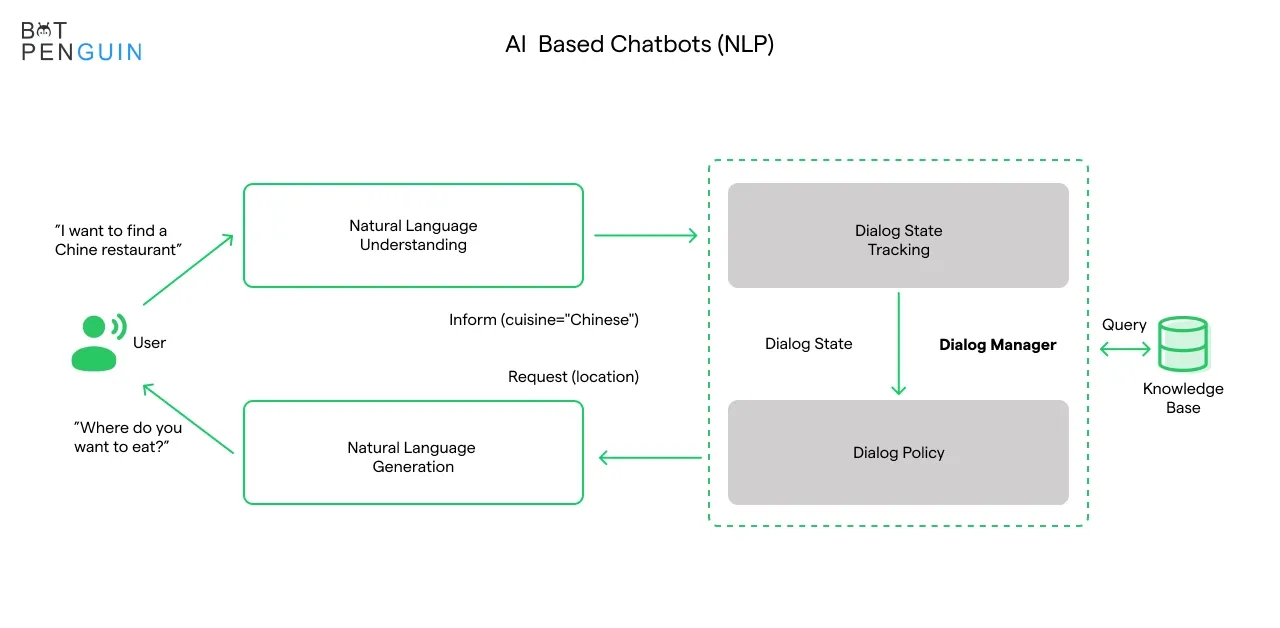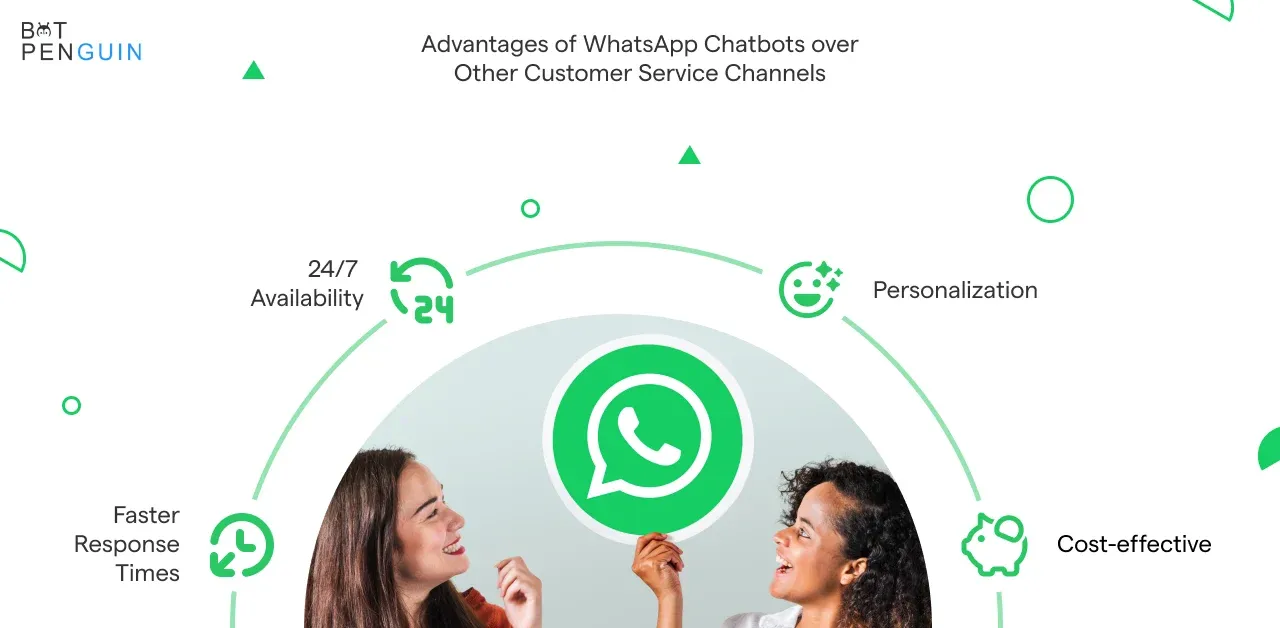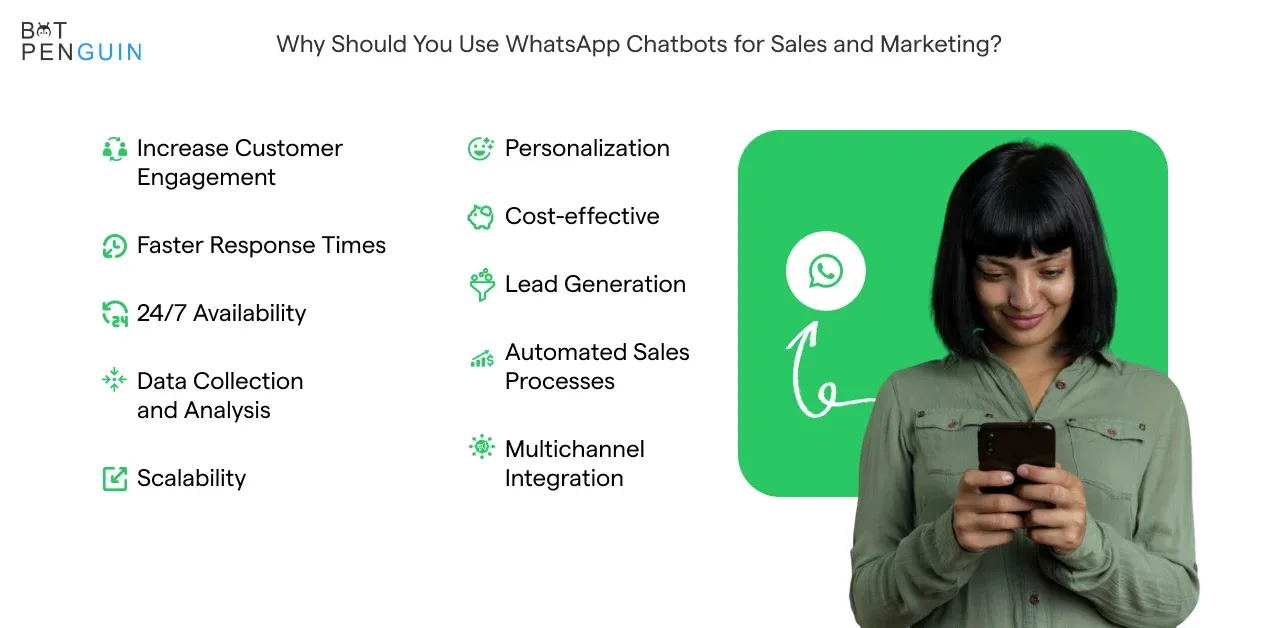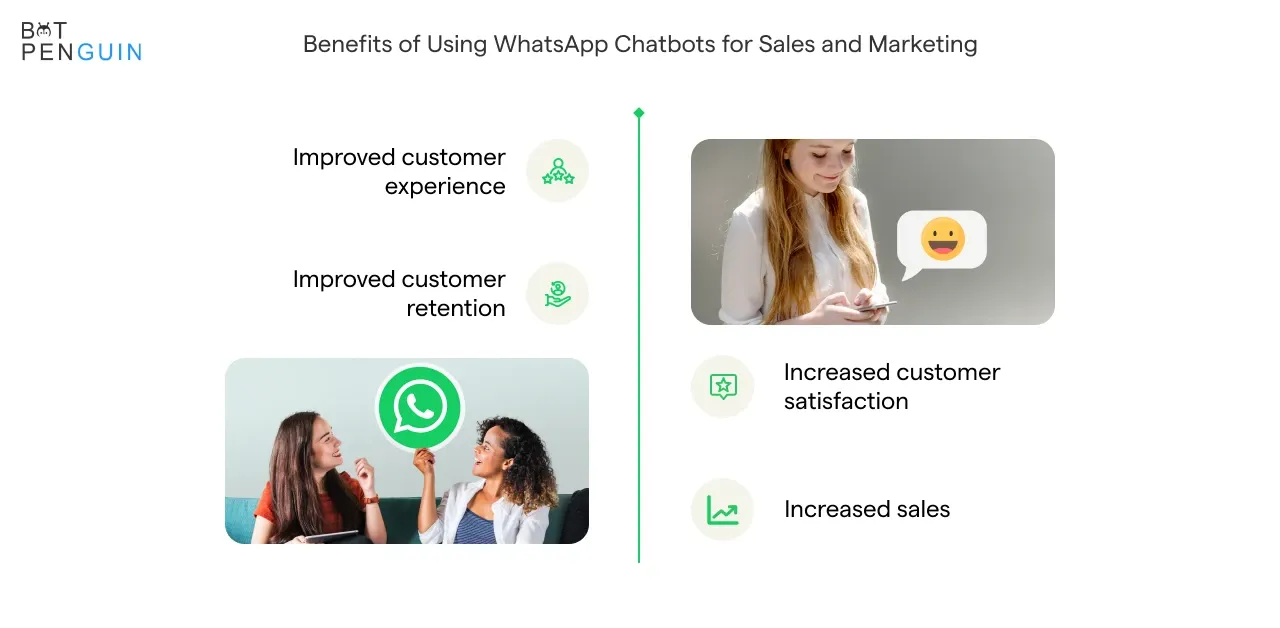Did you know WhatsApp has over 2 billion active users worldwide? That's right, 2 billion! It is the most widely used messaging app worldwide. A recent poll found that 60% of customers prefer messaging to calling for customer care.
So, why not use this powerful platform and incorporate chatbots into your sales and marketing strategy? WhatsApp chatbots can help you engage with your customers, provide instant responses, and personalize the customer experience – saving you time and money.
In this comprehensive guide, we'll take a deep dive into the world of WhatsApp chatbots and show you how to use them for sales and marketing. We'll cover everything from the benefits of chatbots to setting up your chatbot on WhatsApp. You'll have all the information you need to put a successful WhatsApp chatbot plan for your company into place by the end of this article. Let's get started!
What is WhatsApp Chatbot?
If you're not familiar, chatbots are computer programs that mimic human users' speech and are frequently employed in customer care and assistance. WhatsApp chatbots are chatbots built explicitly for use on the WhatsApp messaging platform.
Types of WhatsApp Chatbots
There are two main types of WhatsApp chatbots: rule-based and AI-based.
- Rule-based chatbots are programmed to follow specific rules and responses. They can only answer questions that fall within their programmed responses. For example, the chatbot won't be able to respond if a consumer asks a question that it wasn't designed to address.
- Contrarily, AI-based chatbots use machine learning and natural language processing (NLP) to comprehend and reply to client inquiries. These chatbots can learn from customer interactions and improve their responses over time.

Advantages of WhatsApp Chatbots over Other Customer Service Channels
WhatsApp chatbots offer several advantages over other customer service channels, including
- Faster response times: Chatbots can respond to customer queries instantly without needing a human agent to be available.
- 24/7 availability: Chatbots can be available to customers around the clock, providing support outside regular business hours.
- Personalization: Chatbots can use customer data to provide personalized recommendations and responses.
- Cost-effective: Chatbots can handle many customer queries without requiring additional staff, saving businesses money on customer service costs.

Why Should You Use WhatsApp Chatbots for Sales and Marketing?
There are many reasons for using WhatsApp chatbots as a part of your sales and marketing strategy that will help you substantially grow your business.
Increase Customer Engagement
Chatbots provide an opportunity to engage with customers in real time. Chatbots can help customers feel heard and valued by responding instantly to customer queries. Increased client satisfaction and loyalty may result from this.
Faster Response Times
As mentioned earlier, chatbots can respond to customer queries instantly. This means that customers don't have to wait for a human agent to be available, which can improve customer satisfaction and reduce frustration.
24/7 Availability
Chatbots can be available to customers around the clock, providing support outside regular business hours. Since customers constantly feel as though their requirements are being satisfied, this can increase customer satisfaction and loyalty.
Personalization
Chatbots can use customer information to offer tailored recommendations and responses. This can help customers feel that their needs are being understood and addressed, increasing customer satisfaction and loyalty.

Cost-effective
Chatbots can handle many customer queries without additional staff, saving businesses money on customer service costs. For small enterprises with limited resources, this can be very advantageous.
Lead Generation
Chatbots can assist in lead generation by capturing customer information and qualifying leads. They can gather relevant data and provide personalized recommendations or offers, increasing the chances of converting leads into sales.
Also Read:
Automated Sales Processes
Chatbots can automate sales processes by guiding customers through the sales funnel, providing product information, and even facilitating transactions. This speeds up the sales process, reduces friction, and improves conversion rates.
Data Collection and Analysis
Chatbots can collect valuable data about customer preferences, behavior, and interactions. This data can be analyzed to gain insights into customer trends, preferences, and pain points, allowing businesses to optimize their sales and marketing strategies.
Multichannel Integration
WhatsApp chatbots can be integrated with other marketing channels and systems, such as CRM software or email marketing platforms. This enables seamless communication and data exchange, providing a unified customer experience across different channels.
Scalability
Chatbots can handle multiple conversations simultaneously, allowing businesses to scale their sales and marketing efforts without increasing staff. This scalability ensures that customer inquiries are promptly addressed, improving customer satisfaction and increasing sales opportunities.
How Do WhatsApp Chatbots Work?
Before you and your business benefit from WhatsApp chatbot, it is essential to learn how it works.
The Technology Behind WhatsApp Chatbots
WhatsApp chatbots use APIs (application programming interfaces) to interact with the WhatsApp platform. The API transmits the message to the chatbot's backend for processing when a user submits a message to the chatbot. The chatbot's backend generates a response, which is sent back to the customer via WhatsApp.
The User Experience
From the customer's perspective, using a WhatsApp chatbot is similar to messaging a friend. The customer sends a message to the chatbot and receives a response, just as they would in a regular conversation. However, the chatbot's responses are generated automatically based on the customer's message.
Setting Up a WhatsApp Chatbot
Setting up a WhatsApp chatbot requires a few steps:
- Choose a chatbot platform: There are several chatbot platforms available, such as Dialogflow, ManyChat, and Chatfuel.
- Connect to the WhatsApp Business API: To use WhatsApp chatbots, you need to have a WhatsApp Business Account and connect to the WhatsApp Business API.
- Create a chatbot flow: This involves designing the chatbot's conversation flow, including the responses to customer queries.
- Train the chatbot: Once the chatbot flow is designed, it needs to be trained to recognize and respond to customer queries. This involves testing the chatbot with sample queries and refining its responses until they are accurate and helpful.
- Deploy the chatbot: Once designed and trained, it can be deployed on WhatsApp.
- Monitor and update the chatbot: To ensure it keeps giving accurate and helpful answers, monitoring its performance and making improvements as necessary is critical.
Define the purpose of the chatbot
Before creating a WhatsApp chatbot, define the purpose of the chatbot. What issues are you attempting to address using the chatbot? What goals are you trying to achieve? Are you trying to increase sales or improve customer service? Once you understand the chatbot's purpose, you can create content aligning with those goals.
Create engaging and conversational content
The key to a successful WhatsApp chatbot is creating engaging and conversational content. You want your chatbot to sound like a human, not a robot. Write in a friendly and conversational tone, and include emojis and GIFs to add personality to your chatbot.
You can also use a mix of text, images, and videos to make your chatbot more engaging. Consider creating a chatbot persona that aligns with your brand voice to make the experience more personal for your customers.
Set up the chatbot on WhatsApp
Setting up a chatbot on WhatsApp is easy. First, you'll need to create a WhatsApp Business account if you haven't already. Then, you can use a third-party chatbot builder like ManyChat, Chatfuel, or Tars to make your chatbot.
Once your chatbot is ready, you can integrate it with your WhatsApp Business account using the WhatsApp Business API. Before utilizing the API, you must apply for access to it and receive WhatsApp permission.
Train the chatbot to respond to customer queries.
For a positive customer experience, you must train your chatbot to respond to customer inquiries. You can use a mix of pre-defined responses and machine learning to train your chatbot. Make sure to test your chatbot extensively before launching it to ensure it can handle a variety of customer queries.
Measure the chatbot's effectiveness.
Measuring the effectiveness of your chatbot is essential for improving its performance over time. You can track metrics like response time, customer satisfaction, and sales conversions to see how well your chatbot performs. Use these insights to improve your chatbot and refine your strategy over time.
Benefits of Using WhatsApp Chatbots for Sales and Marketing
Using WhatsApp chatbots for sales and marketing has several benefits, including.
Improved customer experience
WhatsApp chatbots offer a quick and personalized customer experience, which may boost client loyalty and satisfaction.
Increased customer satisfaction
WhatsApp chatbots can increase customer satisfaction and reduce churn by quickly and accurately responding to customer queries.
Increased sales
WhatsApp chatbots can help drive sales by providing product recommendations and offering promotions and discounts to customers.
Improved customer retention
By providing a better customer experience, WhatsApp chatbots can lower customer turnover and increase client retention.

Challenges of Using WhatsApp Chatbots for Sales and Marketing
While WhatsApp chatbots have many benefits, there are also some challenges to consider, including
Technical challenges
Setting up and maintaining a WhatsApp chatbot can be technically challenging, especially for small businesses with limited resources.
User adoption
Getting customers to use chatbots can be difficult, especially for those who need to learn more about the technology.
Data privacy concerns
As with any customer data, there are privacy concerns when using WhatsApp chatbots. Make sure to comply with local data privacy laws and regulations.
Conclusion
Businesses aiming to enhance customer experience, boost sales, and lower churn may find WhatsApp chatbots an effective sales and marketing tool. By defining the purpose of your chatbot, creating engaging content, setting up your chatbot on WhatsApp, training it to respond to customer queries, and measuring its effectiveness, you can create a successful chatbot strategy that aligns with your business goals.
Always putting the customer first is essential, ensuring your chatbot provides a positive and personalized experience. WhatsApp chatbots can be helpful for any company wanting to boost its sales and marketing efforts if used appropriately.
This article has helped you better grasp how to use WhatsApp chatbots for marketing and sales. Please leave a remark if you have any queries or suggestions. We wish you luck with your chatbot plan!
Frequently Asked Questions
How can WhatsApp chatbots enhance sales and marketing efforts?
WhatsApp chatbots can automate lead generation, provide personalized recommendations, send promotional messages, and engage customers in real time, boosting conversions and customer satisfaction.
What are the key benefits of using WhatsApp chatbots for sales and marketing?
WhatsApp chatbots offer 24/7 availability, instant responses, personalized interactions, targeted messaging, lead qualification, and seamless integration with CRM systems, improving efficiency and driving revenue growth.
How can WhatsApp chatbots assist in lead generation?
Chatbots can capture and qualify leads by asking relevant questions, providing product information, and guiding users through the sales funnel, ensuring a smooth and efficient lead-generation process.
How can WhatsApp chatbots improve customer engagement and retention?
Chatbots can engage customers with interactive conversations, deliver personalized recommendations, provide order updates, offer support, and proactively address customer concerns, fostering stronger relationships and improving customer loyalty.
Can WhatsApp chatbots automate sales transactions?
Yes, chatbots can handle sales transactions by allowing users to make purchases directly within the chat interface, providing a seamless and convenient buying experience.
How can WhatsApp chatbots be used for targeted marketing campaigns?
Chatbots can segment customers based on their preferences and behavior, allowing businesses to send personalized marketing messages, offers, and promotions to specific customer groups, increasing the effectiveness of marketing campaigns.
Are WhatsApp chatbots capable of handling customer support inquiries?
Absolutely, chatbots can provide instant support by answering frequently asked questions, troubleshooting issues, providing product information, and escalating complex queries to human agents when necessary.
How can WhatsApp chatbots integrate with existing CRM systems?
Chatbots can seamlessly integrate with CRM systems, capturing and storing customer data, tracking interactions, and updating customer profiles, ensuring a centralized and unified view of customer information.
Can WhatsApp chatbots assist in upselling and cross-selling?
Yes, chatbots can analyze customer preferences and purchase history to offer relevant product recommendations, suggest complementary items, and promote upselling and cross-selling opportunities.
How can businesses get started with implementing WhatsApp chatbots for sales and marketing?
Businesses can start by defining their goals, selecting a chatbot platform or development tool, designing conversational flows, integrating with WhatsApp Business API, testing and refining the chatbot, and gradually scaling up its usage for sales and marketing purposes.


